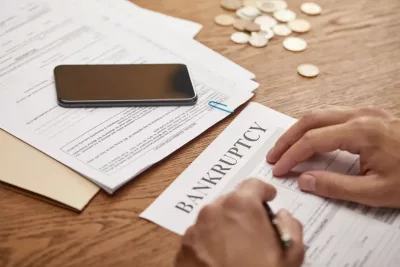Choosing Between a Chapter 7 or Chapter 13 Case
Some people are worried that a bankruptcy petition will stay on their credit report for a long period. While it would indeed be harder to find credit while you are bankrupt, credit scores will still eventually improve. More importantly, getting a fresh start in life is something that a lot of people aspire for.
If you plan to file for bankruptcy or require preliminary bankruptcy information on how to file, give us a call. A reliable Phoenix bankruptcy lawyer can answer your questions about the legal process of filing bankruptcy.
This article will discuss bankruptcies, both under Chapters 7 and 13. It is composed of the following sections:
- Make Sure to Seek Legal Advice from Experienced Professionals
- Choosing Between Liquidation and Reorganization Bankruptcy Cases
- What Happens After Bankruptcy Petitions are Filed
- Advantages of a Chapter 13 Petition for Bankruptcy
- Advantages of a Chapter 7 Bankruptcy Proceeding
- Making the Choice Between Chapter 7 and Chapter 13
- Seeking Legal Help from a Dedicated Local Attorney
Make Sure to Seek Legal Advice from Experienced Professionals
If you are considering bankruptcy, it is highly advisable to promptly seek legal assistance from an established bankruptcy law office. Formally submitting your bankruptcy petition is a key step to be able to benefit from the automatic stay. Through this bankruptcy protection, lenders and debt collectors are prevented from contacting or harassing you.
Aside from helping you fill out bankruptcy forms and prepare the necessary paperwork and supporting documents, a competent local attorney can explain in detail the entire bankruptcy process. Additionally, your lawyer can help you go through the scheduled Meeting of Creditors and subsequent confirmation hearing. All these can be overwhelming, which is another reason why reliable legal services are necessary.
Additionally, bankruptcy attorneys can clarify what can be done to have certain types of debt forgiven and be allowed to repay secured and unsecured debts, if applicable. They can also help document your eligibility to a bankruptcy trustee, who will then administer proceedings brought to court. Well-trained and diligent Phoenix bankruptcy lawyers can further explain these things to you.
Choosing Between Liquidation and Reorganization Bankruptcy Cases
Under relevant federal and state law are various bankruptcy rules and requirements that you must be aware of before you can declare bankruptcy. There are different types of bankruptcy that you may choose from, depending on your objectives and eligibility.
If you require debt relief and intend to file bankruptcy Chapter 7, your monthly income and living expenses will determine your eligibility as a filer. Essentially, you must first pass the bankruptcy means test<span style=”font-weight: 400;”>, as specified by law. Only if one is qualified to file bankruptcy under Chapter 7 can a trustee liquidate your non-exempt assets to pay off priority lenders.
On the other hand, a Chapter 13 bankruptcy declaration is essentially useful if one wishes to avoid foreclosure and repossession. Here, a debt repayment plan that will run for three or five years is proposed to the bankruptcy court. A crucial step, however, is restructuring your overwhelming debts and bringing current payments for secured debts.
If you have any concerns related to the bankruptcy procedure, or if you are still unsure if it is best to file for bankruptcy, hire the best attorneys who will work closely with you. Call us at Phoenix Fresh Start Bankruptcy to know how we can help.
What Happens After Bankruptcy Petitions are Filed

What repels most people from bankruptcy proceedings is that they stay on your credit report<span style=”font-weight: 400;”> for up to ten years. As mentioned, however, rebuilding credit after bankruptcy is not as difficult as it sounds. While declaring bankruptcy for debt relief is not an appealing scenario, it has already helped numerous bankrupt individuals. Through the different bankruptcy chapters, countless people who were once bankrupt eventually had a fresh start in life.
If you are struggling financially, considering bankruptcy could be the best (or even only) option for you. While recent tax debt, criminal fines and penalties, student loans, alimony, and child support are generally not dischargeable, other discharged debts through a bankruptcy declaration can enable you to repay other obligations on time.
The requirements, qualifications, and the entire bankruptcy procedure can be confusing and overwhelming. As such, it is best to get the legal services of a trusted Phoenix bankruptcy attorney who can explain to you how to file correctly. Filing for bankruptcy is not easy, but it is something that can give you a fresh start in life.
Advantages of a Chapter 13 Petition for Bankruptcy
As mentioned above, filing for bankruptcy and proceeding with restructuring will enable you to bring current payments for secured loans. This can stop foreclosure or repossession of collateral (such as your home, car, or other personal property), which is a common reason people opt to file for bankruptcy under Chapter 13.
If you filed for bankruptcy under this chapter, you would be given a repayment period of three or five years. Under pertinent bankruptcy laws, however, not everyone can proceed with filing Chapter 13. It is, in fact, sometimes referred to as wage earner bankruptcy because a low-income earner may not be qualified to file.
Before declaring bankruptcy under this chapter, your monthly income must be regular, and your tax filings must be current. No Chapter 13 must have been filed in the last two years, no Chapter 7 filing must have been filed in the last four years, and no bankruptcy petition must have been dismissed in the last 180 days (for failure to appear in court).
Advantages of a Chapter 7 Bankruptcy Proceeding
If you are looking into filing Chapter 7, you must first pass the bankruptcy means test before working on your bankruptcy forms and paperwork. Here, your monthly income and living expenses will be taken into account. If you pass, your bankruptcy trustee will then facilitate the meeting of creditors, sell your nonexempt assets, and pay creditors in a manner according to the bankruptcy code.
As mentioned above, if you have a lot of assets, generally dealing with secured debt, or if it would be possible for you to pay back some of what you owe to your creditors, a Chapter 13 bankruptcy petition may be a better option for you.
However, for bankrupt individuals with a few assets and whose problem debts include credit card debts, medical bills, or payday loans, filing Chapter 7 may be more advisable. It is also often recommended for filers whose problem debts exceed two-fifths of their annual income and cannot, therefore, pay off debts even with extreme measures.
Making the Choice Between Chapter 7 and Chapter 13
Every bankruptcy petition is unique. In general, however, the automatic stay<span style=”font-weight: 400;”> can also help you stop wage garnishment and stop foreclosure or repossession of your home, car, or other personal property.
Many debtors look into filing a bankruptcy petition to be spared from collection calls from creditors and harassment from debt collectors. Availing of bankruptcy protection, however, is not as simple as it seems.
If you are facing financial problems, promptly seek legal advice. Consumer bankruptcy can help an individual resolve debt under federal court protection, but it all depends on the filing chapter.
For one, a Chapter 13 petition for bankruptcy will allow you to restructure or reorganize your finances. Proceeding with restructuring enables you to bring current payments for secured debts. On the other hand, a Chapter 7 bankruptcy case will likely have your unsecured debts (such as personal loans, medical bills, credit card bills, and other loans with no collateral involved) forgiven or discharged.
A seasoned bankruptcy attorney in Phoenix, AZ can further explain the differences between these two.
Seeking Legal Help from a Dedicated Local Attorney
While not all of your debt problems will be eliminated when you file bankruptcy, it can help you eliminate and wipe out certain types of debt. Having medical debt, credit card debt and most unsecured debts discharged through Chapter 7 can free up a sufficient budget for you to pay back non-dischargeable debts. Alternatively, a Chapter 13 bankruptcy case can help you pursue debt settlement and slowly rebuild your financial future while keeping your assets.
Filing for bankruptcy allows you to have a fresh start with your finances. However, it is best to first consult with seasoned Phoenix bankruptcy lawyers. Before filing bankruptcy, seek legal help from a trusted bankruptcy law firm. Call us at Phoenix Fresh Start Bankruptcy for legal representation and assistance.











